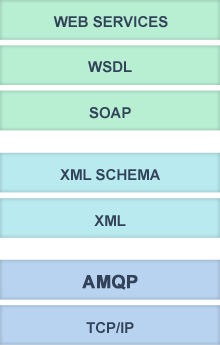AMQP is different from other middleware standards because it is:
- INTEROPERABLE. ALL AMQP clients interoperate with ALL AMQP servers. Diverse programming languages can communicate easily. Legacy message brokers can be retrofitted to remove proprietary protocols from your network. Messaging can be enabled as a cloud service. A straight-forward solution for business messaging and middleware integration, made to satisfy real needs.
- RELIABLE. Capable of eliminating the communication gaps and slowdowns between different platforms, critical systems and application components both within enterprise and out to external systems and organizations.
- UNIFIED. Provide a core set of messaging patterns via a single manageable protocol.
- COMPLETE. JMS provides an API for application protocols, and is reliant on Java. AMQP provides a wire level transport for applications using that API. AMQP is broadly applicable and can be leveraged by any language, and identifies both store-and-forward and publish-and-subscribe semantics in one specification.
- OPEN. Vendor and platform agnostic, and created by users and technology providers working in collaboration.
- SAFE. A secure solution to the problem of transporting value-bearing messages across and between organizations, technology platforms and a virtual cloud computing environment.
Use AMQP to Deliver on Service Oriented Architecture (at last!)

AMQP completes the picture of an open and pragmatic SOA stack by utilizing a TCP/IP infrastructure for transport that provides ubiquitous connectivity. The protocol is a trusted intermediary for asynchronous message delivery with specific qualities of service. XML provides uniform data encoding, while the XML schema provides metadata specification for proper representation. Expected Message Exchange Patterns are provided by SOAP, while Web Services standards provide for business contract representation.
